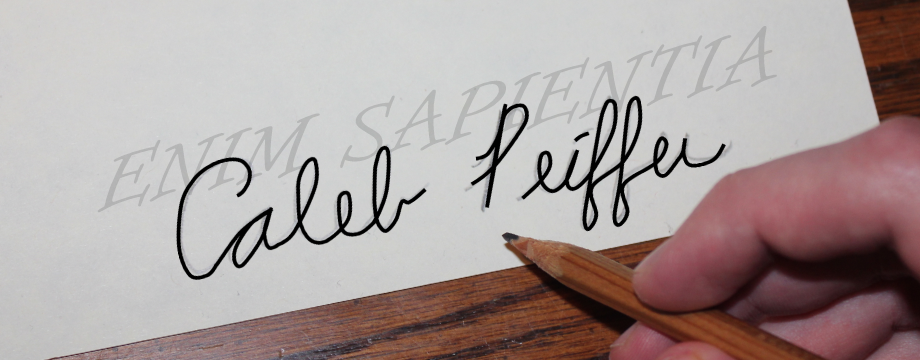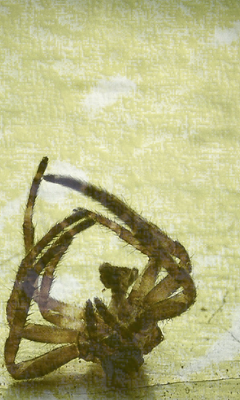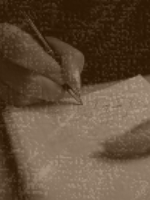Do me a favor. Take your hand off the mouse, close your eyes, and breathe in and out. Relax yourself. The internet’s probably got you a little worked up at the moment. It does that to us. That’s how it works. So calm down. Deep breaths. Now take the time to read and appreciate this message. You may not agree with me – so examine why, and share your opinion with me. Your opinion is valuable*.

Ten Easy Steps to Becoming a Better Writer
1. Compare yourself.
To people, this is destructive. You should never compare yourself to another person. You can’t weigh yourself against others, because their scales are different; they’ve had different experiences and opportunities and there’s no fair way to compare two people, so don’t do it. (And as a Christian, to me, this means not to weigh myself by the scales of man, by any of man’s grounds for judgment, and to weigh myself by God’s scales alone.)
And yet, my first instruction is to compare yourself to other writers?”So,” you’re wondering, “has this guy lost his mind?” I will neither confirm nor deny that allegation. I object on the grounds of relevancy.
Yes. I want you to compare yourself to other artists. This is something I do regularly. You get ideas this way. You learn this way. You get challenged this way. You improve this way. It is fair to compare yourself to another artist as long as you’re objective and use a sense of proportion.
If you’re anything like me, you’re so insecure that sometimes, a little complacency is welcome. But that’s no healthier than insecurity. Instead of trying to be satisfied with yourself the way you are, be confident in your way forward. Admit that you’re not perfect, confidently, and see how others are better and how they can teach you and how you can improve. Learn confidently.
Just try it and see for yourself.
2. Wait for something.
Writing takes time. All things in life that are worth having are worth waiting for. Nowadays, we forget that. Everything’s a rush. We lose our patience waiting for music to download, if kids even have to wait at all anymore. Who remembers the days when we had to wait half-an-hour at least for one song to download, or for a computer program to install?
Try your patience. Go to the busiest restaurant you know with the slowest service you know, order their most complicated dish, and wait. Go alone. Don’t bring your phone or a book or anything or anyone. Put away your attention deficit disorder. Sit tight and enjoy the wait. Let the world go faster than you, it’s all right, it won’t hurt you. Just reflect.
3. Do nothing.
This is just as hard and just as important as waiting for something, but here’s the catch: you don’t have a goal, you don’t have something to look forward to. There is no purpose, no objective, no reason. Life doesn’t need a purpose. Stop acting like a hyperactive child.
I know it can be hard, so very hard, to let yourself do nothing. It’s why when you lie down you’re so tired and yet have trouble sleeping. It’s why you live on coffee. Internet, television, the rat race – our brains are so overstimulated they just–won’t–turn–off. Well, turn it off, all of it, the computer, the TV, the phone. Free yourself from the shackles of the establishment, man. Forget you live in the 21st century. Enjoy some leisure that isn’t prescribed for you.
Go for a walk or a hike, or lie down in the grass (not on a blanket on the grass, but on the grass) and watch the clouds pass, or sit under a tree, or heck, climb a tree! Wherever you go, stay there, for an hour or two or three, and just do nothing, and enjoy it.
4. Do everything.
Put everything on hold, and do all of those thongs you’ve been putting on hold for way too long. This isn’t the day to mow the lawn, this is the day to fix those leaky faucets, paint that room, build that shed, and anything else that you’ve been “meaning to get around to.” No napping, no internet or television (those keep coming up!), no shirking. Get to it!
5. Goof off like it’s an art form.
Be a kid again, play with your imagination, play with kids; surely you must have a child or sibling or cousin or niece or nephew or grandchild or a friend’s kid under twelve you could babysit for a while. Let them teach you how to recapture the bold, carefree spirit of youth.
6. Cry.
Don’t hold it back. Open your wounds. Feel the pain. Love the pain. Access, identify and understand your emotions.
7. Write.
To people you haven’t spoken to in a long time. Don’t message them on Facebook or send them an e-mail. Write to them, you sissy. Write them a letter. Write your sweetheart a love letter. Write your parents a thank-you note. Write to your grandmother, a soldier overseas, a retired friend in a rest home who probably doesn’t get much mail. It’s okay that your letter won’t get to them the instant you’re done writing. It’s okay that you won’t get a letter back for a week or more, or ever.
8. Write and re-write.
A scene, in your current project, or an abandoned project, or something old and done with and maybe even published. Explore the possibilities. What else could have happened? How else could it have happened? Who else could have been there? What other viewpoints could you use? How could you reframe the exact same events and dialogue to make it read differently? Experiment with plot and prose and form. Just have fun.
9. Do something worth writing.
Put your thinking cap on and run a marathon, go spelunking, or go hiking, or maybe mountain biking, bee-hive hiving, deepsea diving, tractor-trailer driving, see the world or see an opera, attend a signing and meet Oprah,
* (10.) Share your opinion.
The footnote is the tenth step. Sharing your opinion with me (or anyone, here or anywhere else), opening a debate with friends and discussing views, will make you a better writer. If you can be calm and objective, express yourself clearly and efficiently, and overcome the fear of speaking up, you’ve contributed in three ways to your development as a writer.
———————————————————







